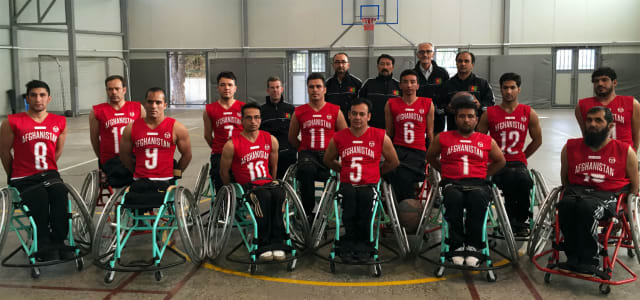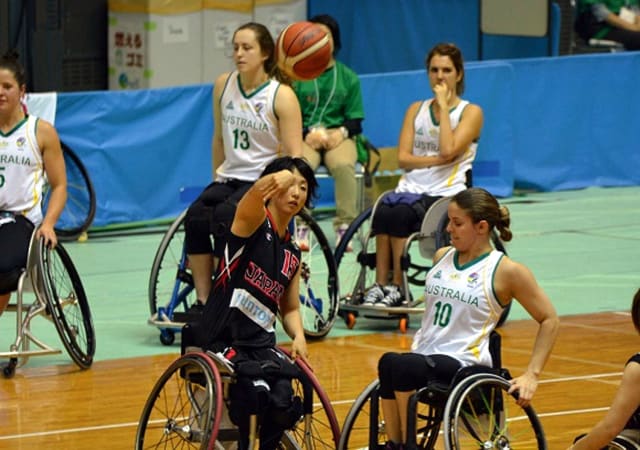In the land of AOZ, there are different definitions of winning
Charlotte (Steve Goldberg's Wheel World) - When all is said and done this weekend in Chiba, Japan, four more teams - three men's and one women's - will starting practicing how to ask
Charlotte (Steve Goldberg's Wheel World) - When all is said and done this weekend in Chiba, Japan, four more teams - three men's and one women's - will starting practicing how to ask, "How much does that cost? and "Where is the bathroom?" in Portuguese, incentivized by knowing they will be in Brazil next summer.
As this column was going to and, with apology to my editor, past deadline, the men's Semi-Final games followed by the women's gold medal match of the 2015 IWBF Asia Oceania Zone (AOZ) Championship were in play.
The Australian men, known to friends and family as the Rollers, thrashed Japan 70-41 to make the Final. Iran then sent Korea to the Third-Place Game with an 83-67 victory and will now face Australia on Saturday for the gold medal. Prior to that, Japan will play Korea for the bronze medal and the last regional spot in next year’s Paralympic Games.
While the Aussie men have been dominant, winning all of their games by comfortable margins, the Aussie women, the Gliders, who were silver medalists in London three years ago, found their path blocked by the Great Wall of China.
They met three times in this tournament, the last one for the entire package of gold medals and tickets to Brazil. China won the first game by 5 points and the second one by 11, but none of that would matter if Australia took the last one.
The Wall held its ground once again and China will be the Asia Oceania Zone's sole representative in Rio with a 59-43 win in the Final.
Though only two teams will leave Japan with gold medals, all four qualifiers will feel like winners with Rio on their minds.
Another team will head home without having won a single game and having been outscored by the hundreds. I'll say without reservation that the scores of their games is not the measure of what Afghanistan, accepted into the IWBF just last March, has accomplished in their first full internationals.

The Afghanistan National Wheelchair Basketball Team is playing its first ever international matches at the 2015 IWBF Asia Oceania Zone Championship Tournament in Chiba, Japan. Afghanistan was admitted to the International Wheelchair Basketball Federation in March 2015.
Photo courtesy of Jess Markt/Afghanistan National Wheelchair Basketball Team
"We all came to this tournament knowing that we would be dealing with a higher level of competition than anything we've previously experienced," said their American coach Jess Markt. "That said, we are all competitors and want to perform our best every time we hit the court - no one on this team came to Japan feeling that it was good enough just to be here."
But getting to Chiba is an epic achievement for a country perpetually abused by conflict and one where those with a disability have been traditionally marginalized. Wheelchair basketball is helping to change that so I hope that when the sting of those losses subsides, these players and coaches should know they have accomplished something historic.
It is only their second time playing outside of their country. In May 2014 they ventured to Italy where they were hosted by one of Europe's top teams, Briante84 of Cantu, for several exhibition games.
The team is the pinnacle of a program founded in 2010 by Alberto Cairo, an Italian physiotherapist who has been working in Kabul with the International Committee of the Red Cross (ICRC) as the head of their orthopedic center there since 1989. Markt has been working with Cairo to develop the league and the game in Afghanistan for both men and women. They now have a league that, as of last year, had over 250 male and female players.
While it is the first official international competition for Markt as well, he does have championship experience. This past April, he coached the Denver Lady Rolling Nuggets to the NWBA Women's Division championship.
Even with that success though, Markt says the most indelible impression for him so far had been.
"The phenomenal focus and consistency it takes to compete at this level. It's clear how much time and effort these teams and players have put in over the years and gives me and the players something to emulate as we work to reach that level over the coming years," he explained.
Markt's objectives coming in were "to see the team improve with every game and learn from every opponent so that, by the end of the tournament, we are playing our best basketball. The players understand this and are working hard to achieve it, even in the face of some difficult losses."
Though the score sheet says it was a 20-point margin, Markt told me that, "Our first game against the United Arab Emirates was actually much closer than the final score indicated. We led in the second quarter and were within four points at the half.
"Unfortunately, we had several players foul out in the third quarter - these are also the best referees we've ever seen! - and the UAE used its superior experience to take advantage of that fact and pull away at the end."
He hoped that the experience gained in the first couple of games might see them win one before leaving to reward the perseverance his team has shown to get to this point. That would not happen though. The learning curve is steep at the beginning.
Seeing improvement in their game, even in defeat, is something Markt believes his players can take home from Japan and build upon. They won't compete in Brazil but neither will one of the best teams in the world over the past 15 years.

Though they mastered Japan with two wins, four-time Paralympic medalists, including silver at London 2012, Australia could not breach the Great Wall of China, losing three times, and will miss the Rio 2016 Paralympic Games. Photo courtesy of Basketball Australia and Merritt Images
After collecting three silver and one bronze medal in the last four Paralympic Games, Australia's women will feel the pain of not competing for the first time in more than a generation.
Steve Goldberg
FIBA
FIBA's columnists write on a wide range of topics relating to basketball that are of interest to them. The opinions they express are their own and in no way reflect those of FIBA.
FIBA takes no responsibility and gives no guarantees, warranties or representations, implied or otherwise, for the content or accuracy of the content and opinion expressed in the above article.
To help make this column as inclusive as possible, please send any national or international event information, story suggestions, or comments to wheelworldmail@gmail.com.